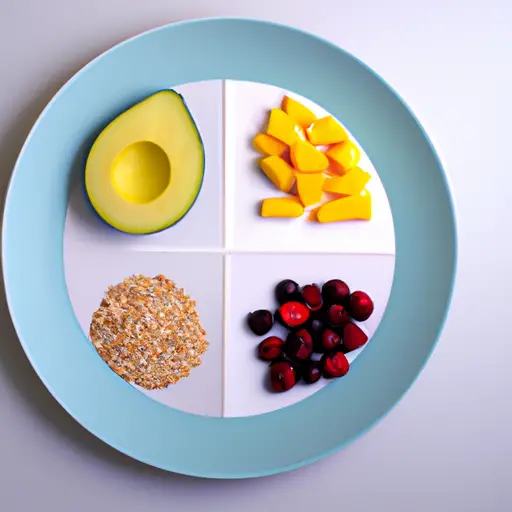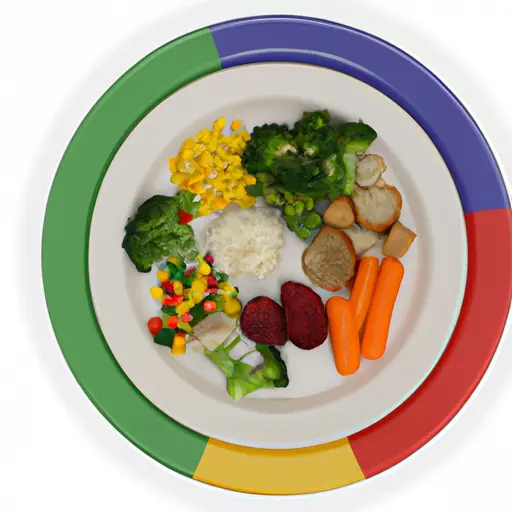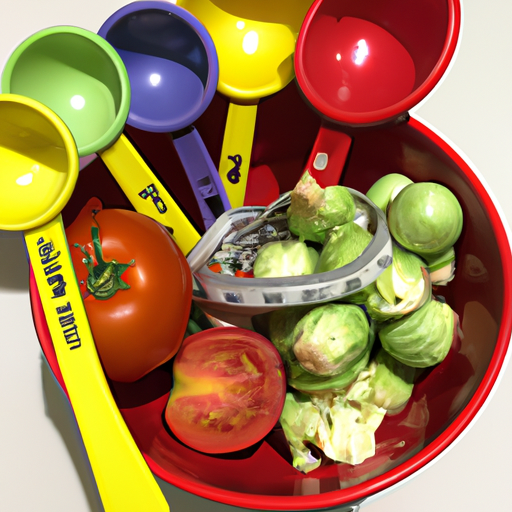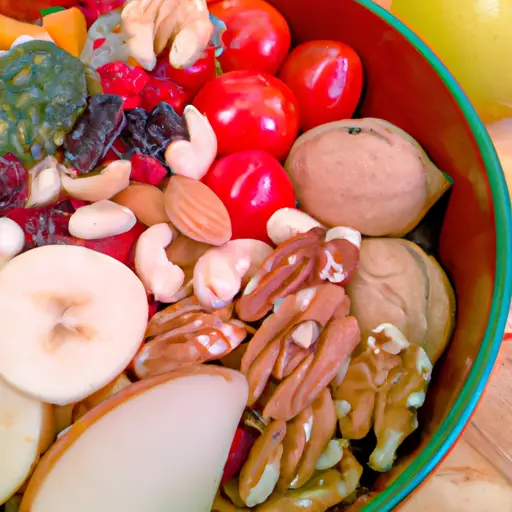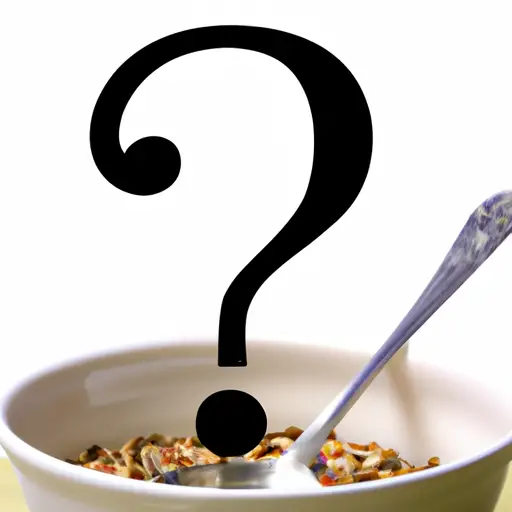The Importance of Portion Control
Explore the Magic of Portion Control for a Healthy Life!
Hi, there! Are you struggling with maintaining a healthy weight? Do you feel unhappy with your body and wish to make some changes? Well, practicing portion control might just be the answer you’re looking for! But what exactly is portion control? Portion control refers to the practice of regulating the amount of food we consume to meet our nutritional needs without overeating. In this blog, we’ll explore the amazing benefits of portion control and provide you with some tips for practicing it in your daily life.
Why Portion Control Rocks!
Let me tell you folks, practicing portion control can have major health benefits!
Firstly, it improves nutrition because when you control how much food you eat, you can ensure you are getting the right amount of nutrients your body needs to function properly.
Secondly, portion control can aid in weight loss. By eating smaller portions, we reduce the amount of calories we consume, which can lead to shedding those extra pounds.
Thirdly, portion control can help to reduce the risk of heart disease. When we consume large portions on a regular basis, we put more stress on our hearts which can lead to various heart diseases. Portion control helps to reduce that stress and keep our hearts happy.
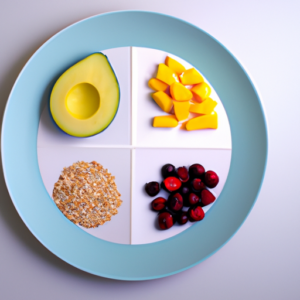
So, how can we practice portion control? One tip is to use smaller plates and bowls. This tricks our minds into thinking we are eating more than we actually are. Another tip is to measure out serving sizes to ensure we are not overeating. It’s also important to include filling fiber-rich foods in our meals to keep us feeling full and satisfied.
All in all, portion control is a great way to improve our overall health and well-being. It’s not about depriving ourselves of our favorite foods, but rather, enjoying them in moderation.
Tips for Practicing Portion Control
As someone who has struggled with overeating, I’ve learned how important portion control is when trying to maintain a healthy diet. Here are some tips that have helped me:
First, try using smaller plates and bowls. This tricks your brain into thinking you’re eating more, when in reality, you’re consuming smaller portions. I’ve found that eating with smaller utensils also helps me eat more mindfully.
Another tip is to measure out your serving sizes. It can be easy to overestimate how much we’re actually eating, so using a measuring cup or kitchen scale can help you stick to recommended serving sizes.
Don’t forget to include fiber-rich foods in your meals. They’ll help you feel fuller for longer periods of time. Some examples include fruits, vegetables, whole grains, and legumes.
Finally, be mindful of distractions when eating. Eating while watching TV or standing at the kitchen counter can lead to overeating without even realizing it. Try sitting down at a table and focusing on your food and the experience of eating.
With practice, these tips can become habits that make portion control feel more natural. It’s important to remember that portion control isn’t about deprivation, but rather, it’s about being mindful of what and how much we’re consuming. By practicing portion control, we can improve our nutrition, lose weight, and reduce our risk of heart disease.
Wrapping It Up: Why Portion Control Is Key
And there you have it, folks – portion control is the way to go if you’re looking for a healthy and sustainable eating plan. Trust me; I’ve seen the benefits myself.
First and foremost, portion control can improve your overall nutrition quality. By watching what you eat and how much of it you eat, you can reduce your intake of saturated and trans fats, added sugars, and excess sodium. Instead, you can focus on nutrient-dense foods that support your energy levels and keep you feeling full for longer.
Another benefit of portion control is that it can help you lose weight. When you eat more than your body needs, it stores the excess as fat, leading to weight gain over time. In contrast, by practicing portion control, you can create a calorie deficit without necessarily having to give up your favorite foods or engage in extreme dieting measures.
Finally, portion control can reduce your risk of heart disease and other chronic conditions. Studies have found that people who consume larger portions are more likely to develop heart disease, obesity, and type 2 diabetes. By managing your portions, you can take steps to protect your long-term health.
So, how can you start practicing portion control today? Here are some easy-to-follow tips: use smaller plates and bowls, measure out serving sizes using measuring cups or scales, and include filling fiber-rich foods like fruits, vegetables, and whole grains in your meals.
Remember, portion control is not about restricting yourself; on the contrary, it’s about enjoying food mindfully and responsibly. Give it a try, and you’ll be amazed at how much more satisfying your meals can be – both for your body and your taste buds.
Portion Control FAQs
What is the importance of portion control in the food industry?
Let me tell you why portion control is crucial in the food industry. First and foremost, it helps in maintaining a healthy and balanced diet. Many of us tend to eat more than necessary, leading to overeating, unhealthy weight gain and obesity. By controlling our portions, we can avoid consuming excess calories, which can contribute to long-term health problems like heart disease, diabetes, and even cancer. Moreover, portion control can help to save money. Restaurants, for instance, tend to serve large portions, which can lead to waste and unnecessarily high prices. By asking for smaller portions or sharing meals, we can help reduce food waste and save some money. Portion control also helps us appreciate our meals more. When we eat less, we tend to savor and enjoy our food more, as opposed to overeating and not fully tasting or enjoying our meals. By controlling our portions and eating slower, we can fully appreciate every bite we take. To sum it up, portion control is essential in the food industry as it promotes healthy eating habits, reduces food waste, saves money, and helps us enjoy our meals more. So next time you sit down for a meal, take a moment to decide on the right portion size for you. Your body and wallet will thank you.
What are the benefits of portion control for weight loss?
Portion control is crucial when it comes to weight loss. It helps you regulate the amount of food you eat, and it can result in fewer calories consumed. By limiting your portions, you can reduce the amount of food on your plate, which can lead to a decrease in calorie intake. This way, you can lose weight without having to give up your favorite foods completely.One benefit of portion control is that it helps you maintain a healthy body weight. By limiting your portions, you decrease your calorie intake, which can help you lose weight over time. It also helps you prevent overeating, which can lead to weight gain. By learning to eat in moderation, you can sustain a healthy weight and reduce your risk of obesity-related diseases.Another benefit of portion control is that it can help you feel more satisfied. By eating smaller portions, you may be able to enjoy the flavor of your food more fully, and you’ll be less likely to feel bloated or uncomfortable after eating. This can lead to a more positive relationship with food, which is essential for long-term weight management.In conclusion, portion control is crucial for weight loss and overall health. It helps you regulate your calorie intake, maintain a healthy body weight, and feel more satisfied with your food. By incorporating portion control into your lifestyle, you can enjoy your favorite foods without sacrificing your health goals. So, start by measuring your servings and paying attention to your hunger and fullness cues, and you’ll be on your way to a healthier, happier you.
what is the importance of portion control?
Oh boy, let me tell you something, portion control is key when it comes to maintaining a healthy lifestyle. You see, consuming too much food at once can lead to overeating, weight gain, and even chronic illnesses such as diabetes. That’s why I always try to keep an eye on how much I’m eating.
Experts recommend using your hand as a guide for proper portion sizes. For example, a serving of protein should be about the size of your palm, while a serving of carbs should be about the size of your fist. Keeping track of your portions can help you stay within your daily calorie budget and ensure that you are getting all the nutrients your body needs.
But hey, I get it, it can be tough to resist those oversized restaurant portions or that extra slice of pizza. That’s why it’s important to practice mindful eating and listen to your body’s hunger cues. If you feel full, it’s okay to stop eating, even if there’s still food on your plate.
Remember, portion control isn’t about depriving yourself of the foods you love, it’s about finding balance and moderation. So, next time you’re about to scarf down that giant plate of food, take a step back and remember the importance of portion control for your health and well-being.
In conclusion, proper portion control is essential for maintaining a healthy weight and preventing chronic illnesses. By practicing mindful eating and using portion size guidelines, we can find balance and moderation in our diets. It’s all about listening to our bodies and providing them with the nutrients they need without overindulging in excess. So, keep those portion sizes in check and enjoy your food in a way that nourishes both your body and your soul.
